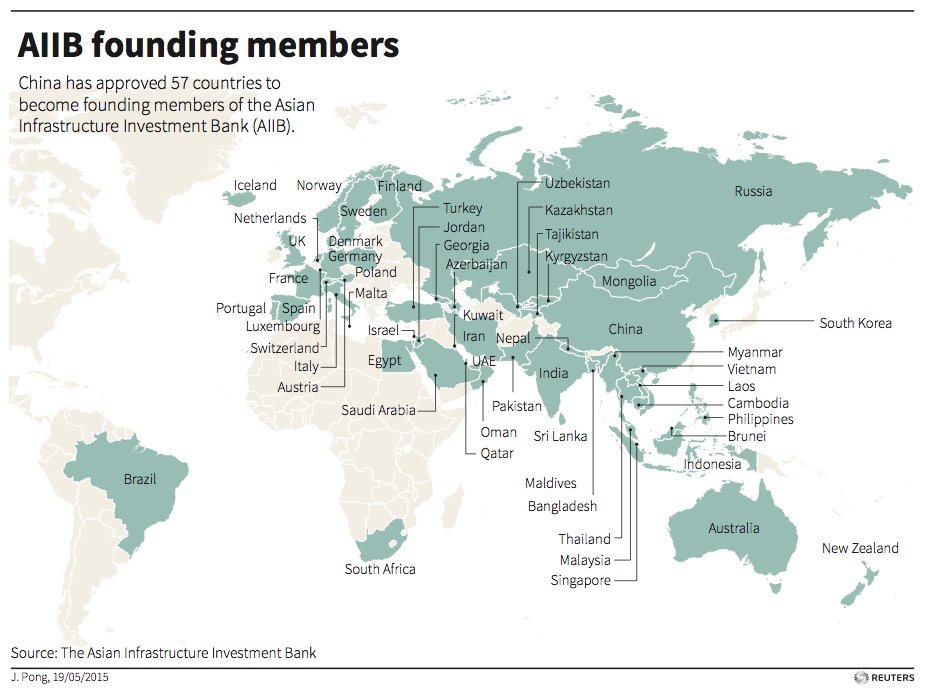It was big news when the United Kingdom, followed quickly by other European nations, announced in March 2015 that it intended to be a founding member of the Asian Infrastructure Investment Bank (AIIB). After all, this was a Chinese-led initiative that some considered to be a direct challenge to the Asian Development Bank and the World Bank — and perhaps a first step in a Chinese effort to undermine the Bretton Woods system dominated by the West. And the United States, while expressing that it “stands ready to welcome new institutions into the international development architecture,” had not only clearly signalled that it was not going to join, it apparently had discouraged G7 members and allies from joining. Nonetheless, by April 15, 30 countries had joined the original 21 Asian applicants to be counted among the founders, including U.S. allies such as the U.K., Germany, France, Israel, South Korea, Australia and the Netherlands.

General agreement among experts and media was that for the Obama Administration, this was a “debacle,” as Elizabeth Economy opined. The U.S., she argued, should have joined the bank or at least welcomed it, along with the participation of others. Opposition was making the United States look weak.
Most of the discussion around the launch of the AIIB was focused on the U.S.-China relationship, China’s efforts to impact global institutions and governance through the AIIB, and the different approaches that the United States, other nations, and multilateral development banks have taken in response to this initiative. What if we look at it from the point of view of the British, French, and Germans who joined as founding members? Does this case suggest that major American allies were starting to turn towards China at the expense of the transatlantic relationship?
I would argue that it does not. Rather, three main factors influenced the decisions of France, Germany and the United Kingdom to join the AIIB: risk, rebalancing, and reward. The level of risk involved in contravening any U.S. request not to get involved was low because becoming a founding member of the AIIB did not threaten U.S. national interests, much less their own national interests. Rebalancing was a factor because although all three countries remained firm in their alliances with the United States, they had consistently expressed support for China playing a larger role in global governance; the decision to join the AIIB was a logical expression of their approach. Finally, the potential reward for joining the bank was considerable, as all three nations were keen to continue to extract economic benefits from positive relations with China. Because of this combination of factors, the decision to join the AIIB should be interpreted not as a fundamental break with the United States, but rather as representing a continuation of an approach that was already in place. Two years on, we see that divergence of views on the AIIB between the U.S. and France, Germany, and the U.K. did not cause lasting harm to the transatlantic relationship that has been a bedrock of the post-war period.
Has the situation changed in the Trump era?
After President Trump’s recent visit to Europe, Washington and the rest of the world have been busy analyzing the transatlantic relationship and where it may be headed. German Chancellor Angela Merkel’s comments after the G7 summit that “the times when we can fully rely on others have passed us by a little bit” are perhaps the first indicators that the nature of this partnership is in transition.
European and U.S. relationships with China did not appear to be high on the agenda during this trip, but at least one topic was discussed where China and Europe currently share views that are apparently not held by Washington: the Paris climate accords. Chancellor Merkel, in fact, called the talks with President Trump on this topic “very unsatisfying.” President Xi Jinping, however, has been vocal on his support for the Paris Agreement, pledging his support earlier this month during a phone call to the new French President Emmanuel Macron, who in turn told Trump on May 25 that the Agreement was important for France and the international community, urging him not to make any “hasty” decision to pull the U.S. out of the accords.
Just as in the AIIB founding membership case, the rewards for Europe to align with China on the Paris Agreement rather than the U.S. are tempting: they believe that this is a crucial step towards stopping, if not reversing, climate change and adapting to its effects. In addition, Germany, France, the U.K. and other U.S. allies have welcomed China’s role as a committed partner in the Paris Agreement. Rebalancing in this case, as with the AIIB, is not about turning away from alliances, but rather is a recognition of the benefits of developing and developed nations working together on issues of regional and global import.
When it comes to risk, however, the situation might be different for the climate accords. The decision of European allies to become founding members of the AIIB did not put U.S. security interests at risk. Perhaps because the Paris goals can touch on issues of national energy security, differences between approaches may cause tensions across the Atlantic. Here it will be interesting to see how the U.S.-Europe-China dynamic becomes a factor, if it at all.
A signal for Washington
The AIIB case suggests that in situations where risk is minimal and rewards are tempting—and if U.S. allies continue to believe that having China be a more engaged global player is good for global stability and growth—European nations might be expected to disagree with Washington and align with China. The transatlantic relationship is facing new challenges today, while opportunities for Europe and China to cooperate – such as climate change and the Belt and Road Initiative – are significant. The mix of risk, rebalancing, and reward in these situations could prove to be an important factor in how Europe acts if faced with choices between Washington and Beijing.


